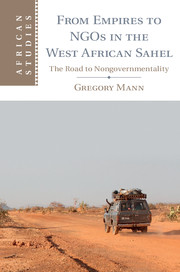Conclusion
Published online by Cambridge University Press: 05 January 2015
Summary
In the 1990s, much less twenty-odd years later, nothing so abstract as human rights was visible on the road to Douentza. One could see signs of power, in the form of the white 4×4s of international NGOs, and the state was present, if only in traces and at the gendarmes’ posts. But much that seemed obvious was not even true.
This is what I learned. In the 1970s, international NGOs had not muscled their way into newly independent African states uninvited. At least some of them were sought out. Once present, they worked to make themselves at home. Shifting from relief to development, CARE’s agents burrowed into the administrations of Mali and Niger, seeking to make themselves useful, even necessary, in the wake of the immediate drought emergency. In contrast, even after their own sudden rise to prominence a few years later, human rights organizations remained on the outside looking in. Although they fixed their gazes steadily on a small number of prisoners, they posed an even deeper challenge to the exercise of African sovereignties than did the humanitarians and the development agents. In the long run, both NGOs and human rights campaigns had viral effects, not in the sense of spreading rapidly – although they did – but in the sense of investing other political forms, injecting them with their own particular politics, and reprogramming their hosts. The emergent form of nongovernmentality that they represented was never in and of itself “neoliberal.” It did, however, pry open the gap between state and government that crushing debt, structural adjustment, the end of Cold War subsidies, and a host of other factors would combine to widen.
- Type
- Chapter
- Information
- From Empires to NGOs in the West African SahelThe Road to Nongovernmentality, pp. 243 - 248Publisher: Cambridge University PressPrint publication year: 2014

